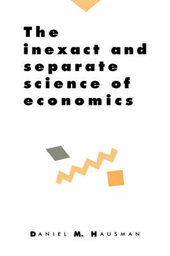
|
The Inexact and Separate Science of Economics
Hardback
Main Details
| Title |
The Inexact and Separate Science of Economics
|
| Authors and Contributors |
By (author) Daniel M. Hausman
|
| Physical Properties |
| Format:Hardback | | Pages:388 | | Dimensions(mm): Height 236,Width 156 |
|
| Category/Genre | Economic theory and philosophy |
|---|
| ISBN/Barcode |
9780521415019
|
| Classifications | Dewey:330 |
|---|
| Audience | | Professional & Vocational | |
|---|
| Illustrations |
8 Line drawings, unspecified
|
|
Publishing Details |
| Publisher |
Cambridge University Press
|
| Imprint |
Cambridge University Press
|
| Publication Date |
31 January 1992 |
| Publication Country |
United Kingdom
|
Description
This book offers a comprehensive overview of the structure, strategy and methods of assessment of orthodox theoretical economics. In Part I Professor Hausman explains how economists theorise, emphasising the essential underlying commitment of economists to a vision of economics as a separate science. In Part II he defends the view that the basic axioms of economics are 'inexact' since they deal only with the 'major' causes; unlike most writers on economic methodology, the author argues that it is the rules that economists espouse rather than their practice that is at fault. Part III links the conception of economics as a separate science to the fact that economic theories offer reasons and justifications for human actions, not just their causes. With its lengthy appendix introducing relevant issues in philosophy of science, this book is a major addition to philosophy of economics and of social science.
Reviews"Overall, this book is well written, cogently argued, and extremely thought provoking. Hausman has a thorough grasp of both the important philosophical literature and the important economic literature. And the book contains an excellent short appendix discussing the major issues in the philosophy of science." Choice "This is a fine book on the methodology of economics...This book offers a clear and perceptive discussion of the methodology of economics which maintains a delicate balance between the detailed discussion of the practice of economic analysis, the general debates within the philosophy of science, the history of economic method, the debate between allternative methodological schools, and the proposal of methodological reform. Indeed, the skill with which these various themes are handled and integrated, and the many detailed arguments deployed, makes this book extremely valuable as a self-contained text for an advanced undergraduate course in economic methodology, but no less interesting for the more experienced student of methodology, or the practising economist." Alan Hamlin, Times Higher Education Supplement "Th[is] book is well worth reading and mulling over; much of what it has to say needs to be considered by institutionalists as well as by neoclassicists." Journal of Economic Issues "...challenging and stimulating...[this book] does reflect an insightful familiarity with the nature and uses of economics. Its criticisms of the discipline are not to be lightly dismissed. It is definitely recommended reading for academic economists and advanced graduate students." Social Science Quarterly "...presents a major intellectual challenge to economic methodology and economic science. He would have us embrace Mill's conception of economics as an inexact and separate science. His proposed reconstruction of economic science deserves both our attention and our considered scrutiny." James R. Wible, Southern Economic Journal "...a timely and persuasive reformulation and defense of the traditional view of economic methodology. In my judgment, this is the best book on the methodology of economics in many years." David Phillips, Philosophical Review
|